There will be new controls on goods between different parts of the UK under Boris Johnson’s Brexit deal, the government has admitted.
An action plan published on Wednesday says businesses will need to fill out export declarations for goods moving from Great Britain to Northern Ireland.
Ministers have also admitted there will need to be extra border infrastructure in Northern Irish ports to ramp up checks on food and live animals. Spot checks will also take place in ports.
Download the new Independent Premium app
Sharing the full story, not just the headlines
But ministers denied that the checks amounted to a border, the paper stating that the protocol does not create “any kind of international border in the Irish Sea between Great Britain and Northern Ireland”.
Cabinet office minister Michael Gove told the Commons: “In order to ensure UK trade qualifies for tariff free status, there will need to be declarations on goods as they move from GB to NI. But these systems will be electronic and administered by UK authorities.
He added that “implementation of the protocol will not involve new customs infrastructure” but said the UK acknowledged that “some expansion of existing infrastructure to provide for some additional new process for the agriculture and food sector”.
The “sanitary and phytosanitary” checks to be carried out by this infrastructure are technically not customs checks, but are still checks.
Boris Johnson had previously said there would be no checks at all within the UK. On 8 December ahead of the election he said: “There’s no question of there being checks on goods going NI/GB or GB/NI because they are part of – if you look at what the deal is, we’re part of the same customs territory and it’s very clear that there should be unfettered access between Northern Ireland and the rest of GB.”
Shadow Cabinet Office minister Rachel Reeves said that “many fear” the Government is not willing to admit the full extent of additional checks.
She told the Commons: “We welcome the statement today but it does expose the broken promises made by the Prime Minister. Today there has been an admission, for the first time, that there will be additional checks, that there will be tariffs on goods at risk of entering the single market.
The latest news on Brexit, politics and beyond direct to your inbox
“Even now, many fear that the Government are not willing to admit the full extent of those. We have seven months to get this right and we must.”
Mr Gove responded: “The approach that we’ve taken is designed to ensure the maximum level of security for the businesses of Northern Ireland and if the protocol is implemented in line with our approach that means they will have unfettered access to the rest of the UK’s internal market and also free access to the EU’s single market.
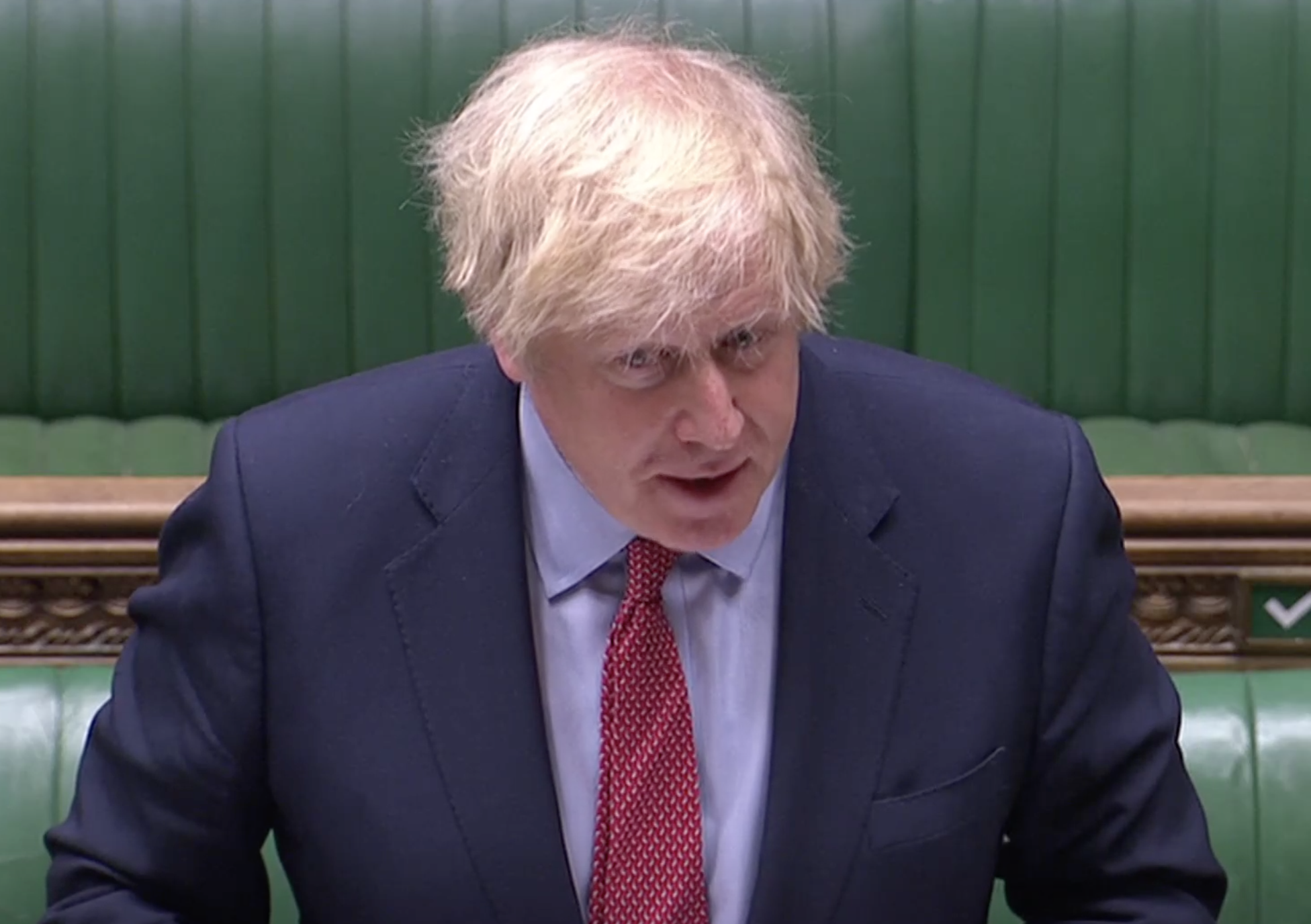
“That is a great prize and one that I believe all businesses in Northern Ireland would want us to help them to grasp.”
The question of implementing the agreement on Northern Ireland, which has already been signed, is separate to the ongoing negotiations to sign a trade agreement. Implementation of the Northern Ireland agreement is being discussed at a “joint committee”, with the UK represented by Mr Gove.
Brussels has suggested the UK is not making enough progress on implementing the protocol, and has said the constructions of new border infrastructure for checks on goods within the UK needs to start immediately to be ready in time.
Talks for a new trade agreement are currently deadlocked, with progress described by both sides as disappointing. If the UK has not signed a deal by 1 January 2021 it will leave the single market and begin trading with the EU on World Trade Organisation terms, facing new tariffs and quotas.
The withdrawal agreement negotiated by Boris Johnson includes a provision to extend the transition period by up to two years, but the government has rejected calls to use it.
Labour leader Keir Starmer has said he is not calling for an extension, but the Liberal Democrats say they will introduce legislation to force the government to seek one.
“It is clear the government have not made nearly enough progress on Brexit trade talks,” the party’s acting leader Ed Davey said
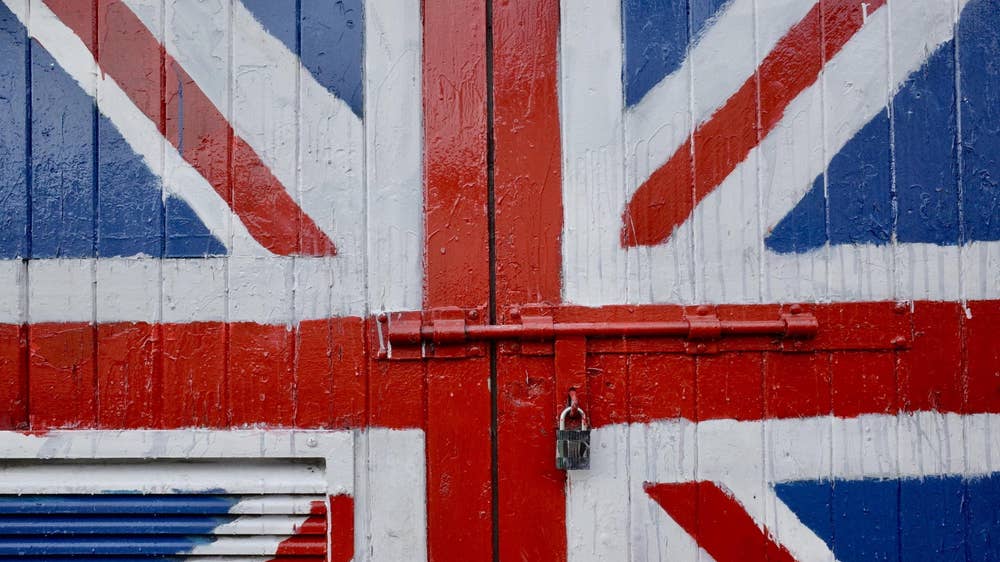
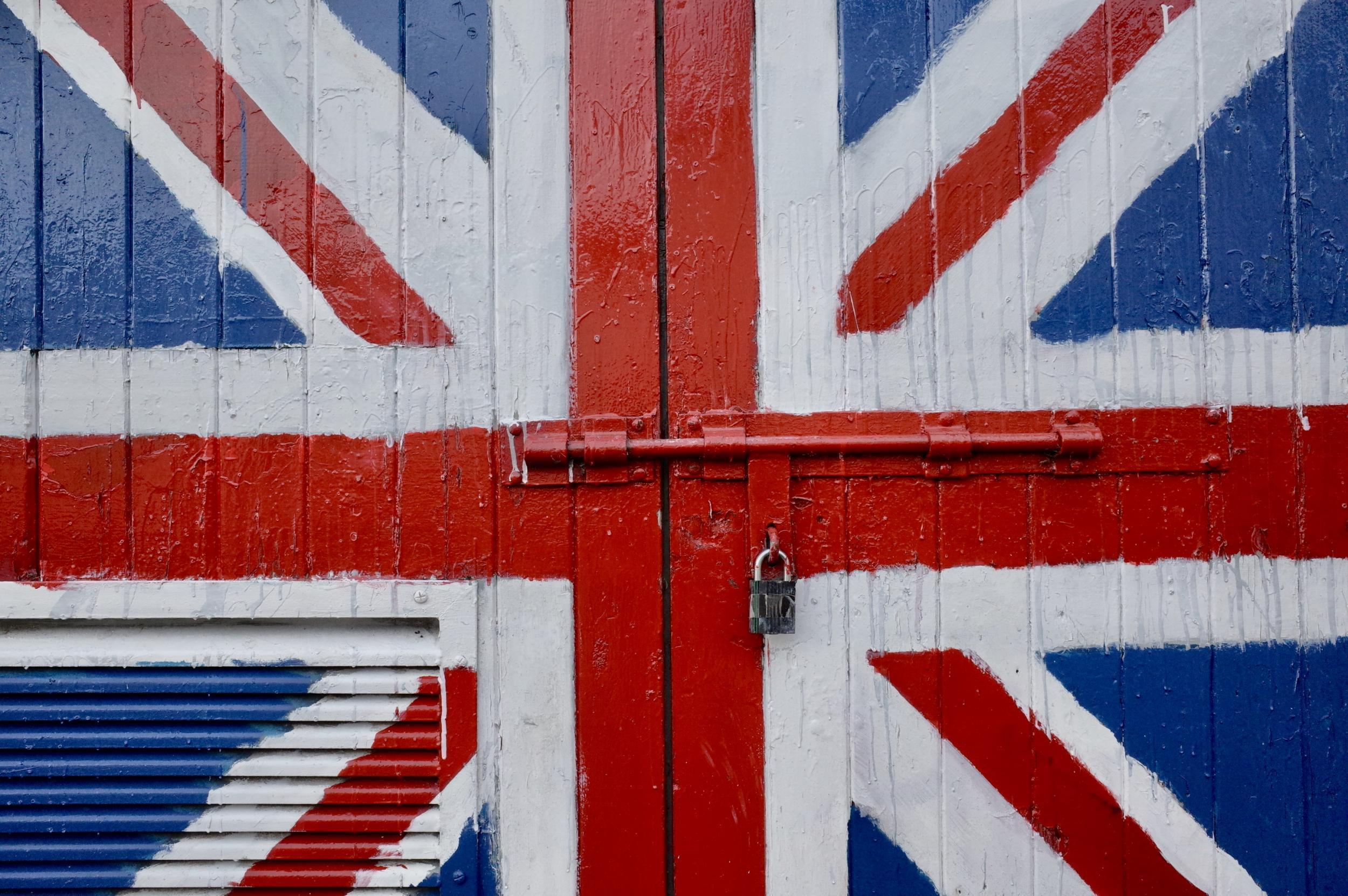
1/12 Derry, Londonderry
A garage door displaying unionism, bolted shut, like a visual representation of Brexit Britain, locked to outsiders, safeguarding what’s inside
Richard Morgan/The Independent
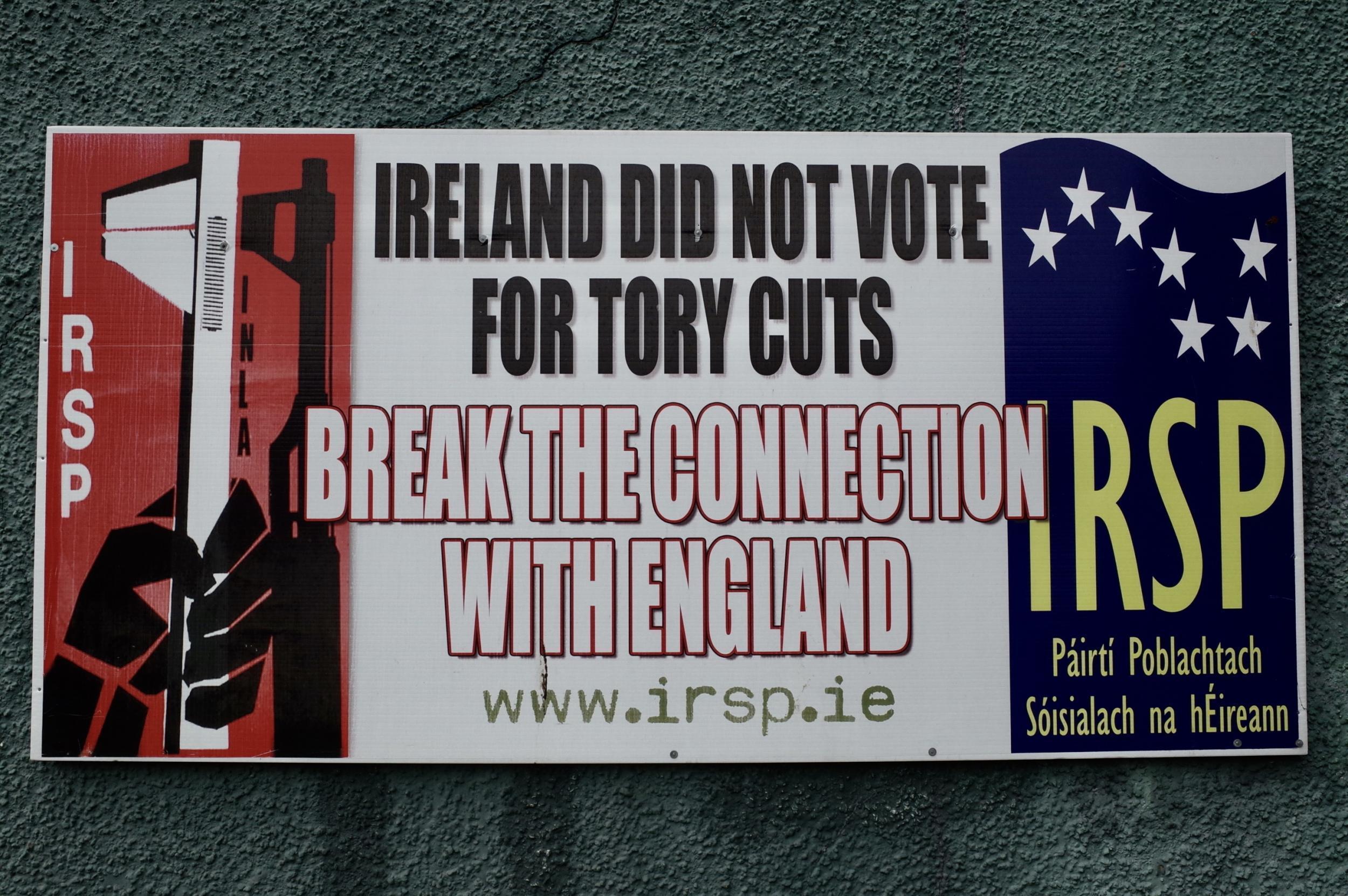
2/12 Derry, Londonderry
Rossville Street, the site of Bloody Sunday, where messages demand a severance with England. From this perspective, Britain is England in sheep’s clothing, the real empire, the centre of colonial power
Richard Morgan/The Independent
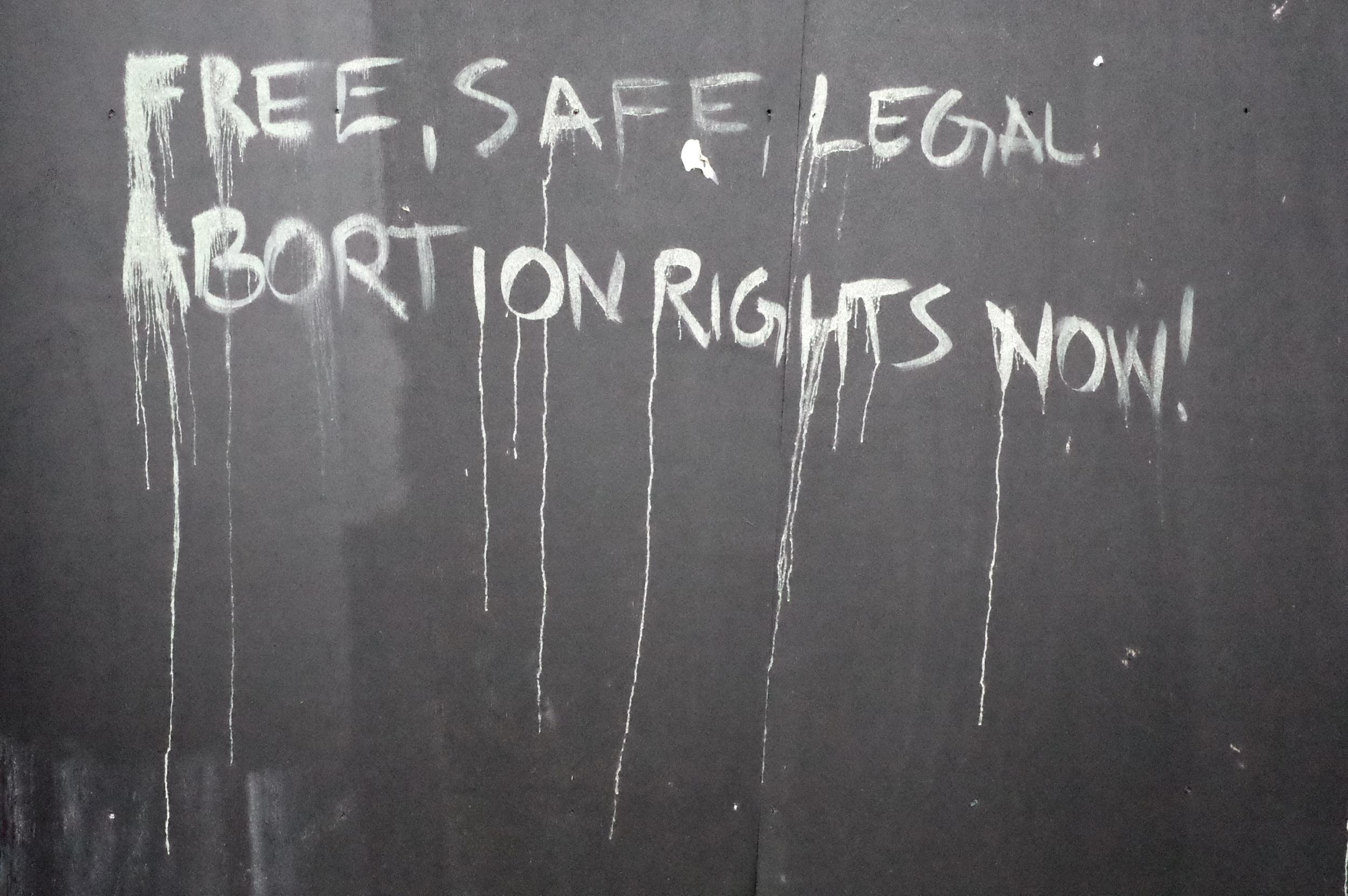
3/12 Bangor
A political message in paint not yet dry, still forming, setting, adjusting, or in old paint finally eroding, melting away
Richard Morgan/The Independent
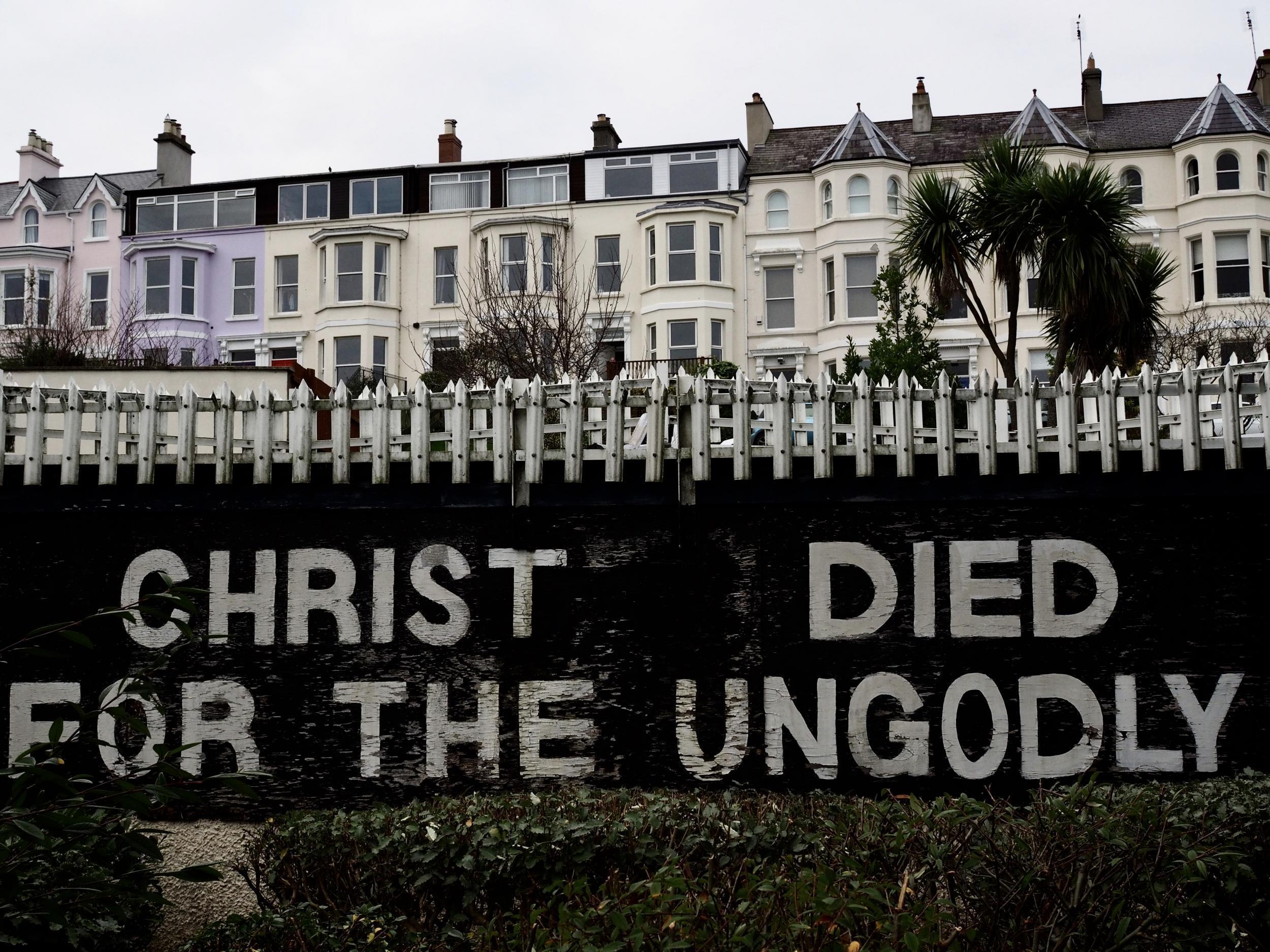
4/12 Bangor
Moral judgement frames a residential view. The message seeks to make everybody involved in the religious narrative: those who don’t believe are those most in debt
Richard Morgan/The Independent
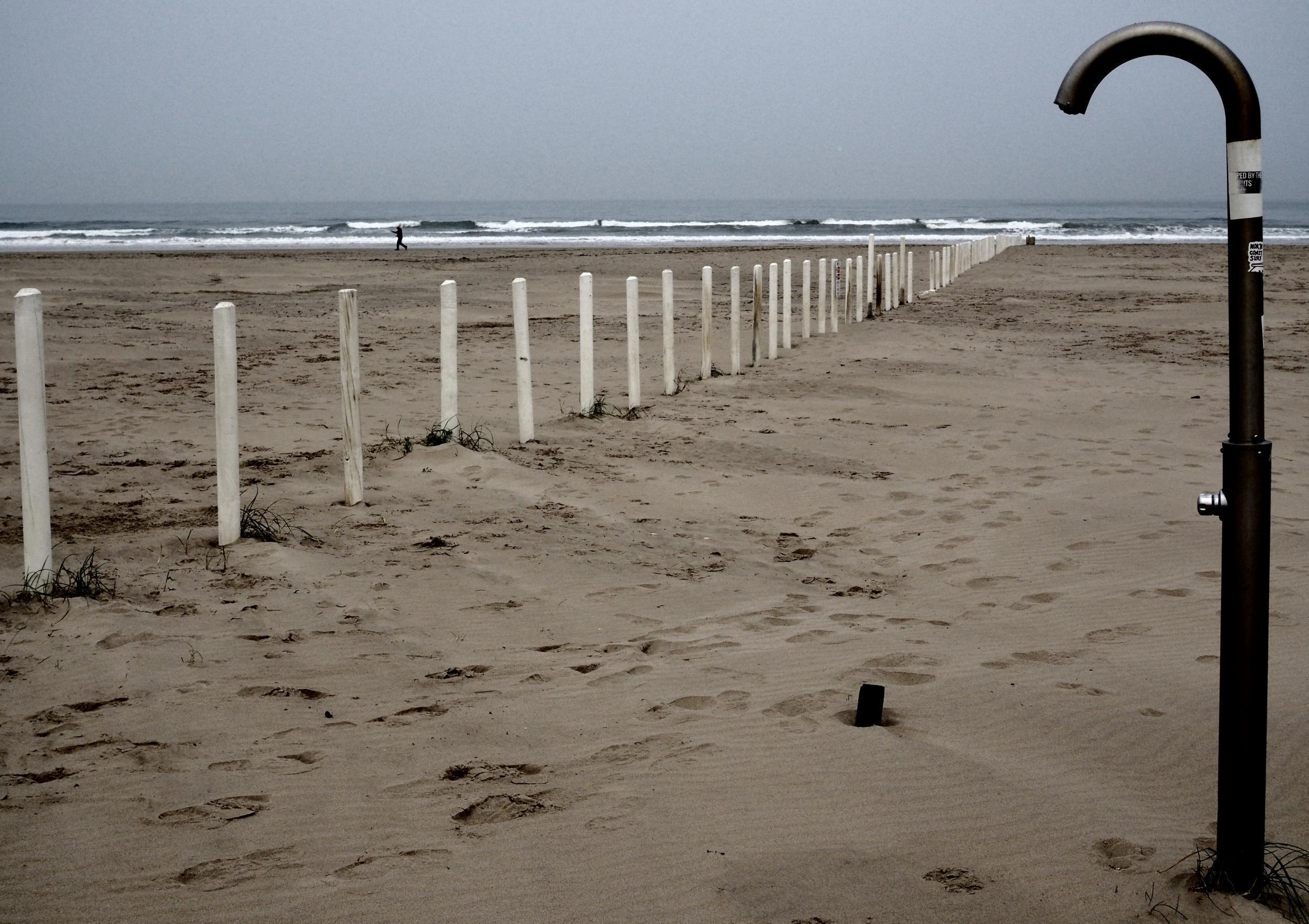
5/12 Castlerock
The beach is sparse and almost empty, but covered in footprints. The shower is designed to wash off sand, and a mysterious border cuts a divide through the same sand
Richard Morgan/The Independent

6/12 Belfast
Two attempts to affect and care for the body. One stimulated by vanity and social norms and narratives of beauty, the other by a need to keep warm in the winter night
Richard Morgan/The Independent
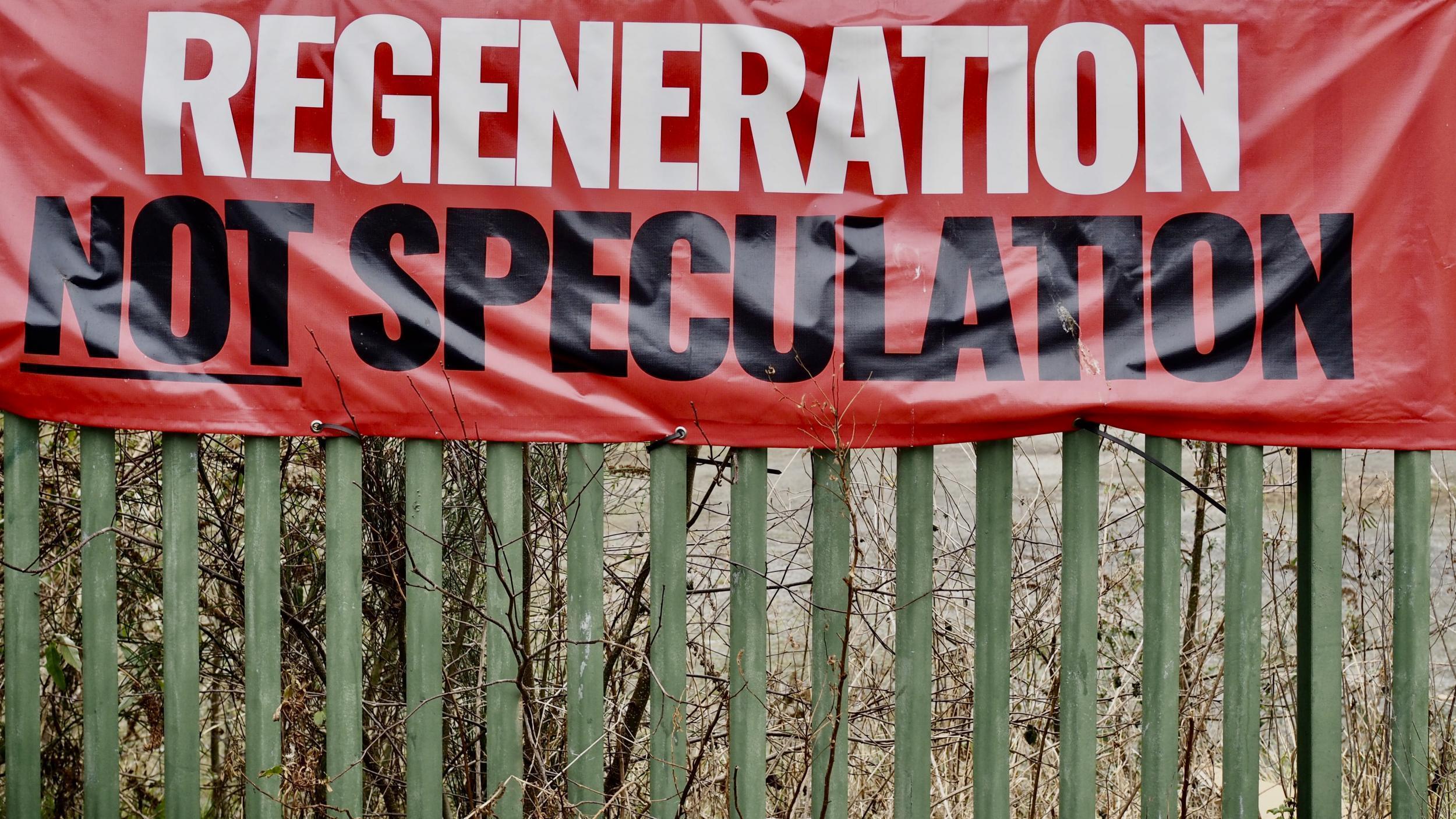
7/12 Belfast
The gate to an unclaimed piece of land, where nothing is being built, where no project is in the making, where a sign demands the creation of something new
Richard Morgan/The Independent
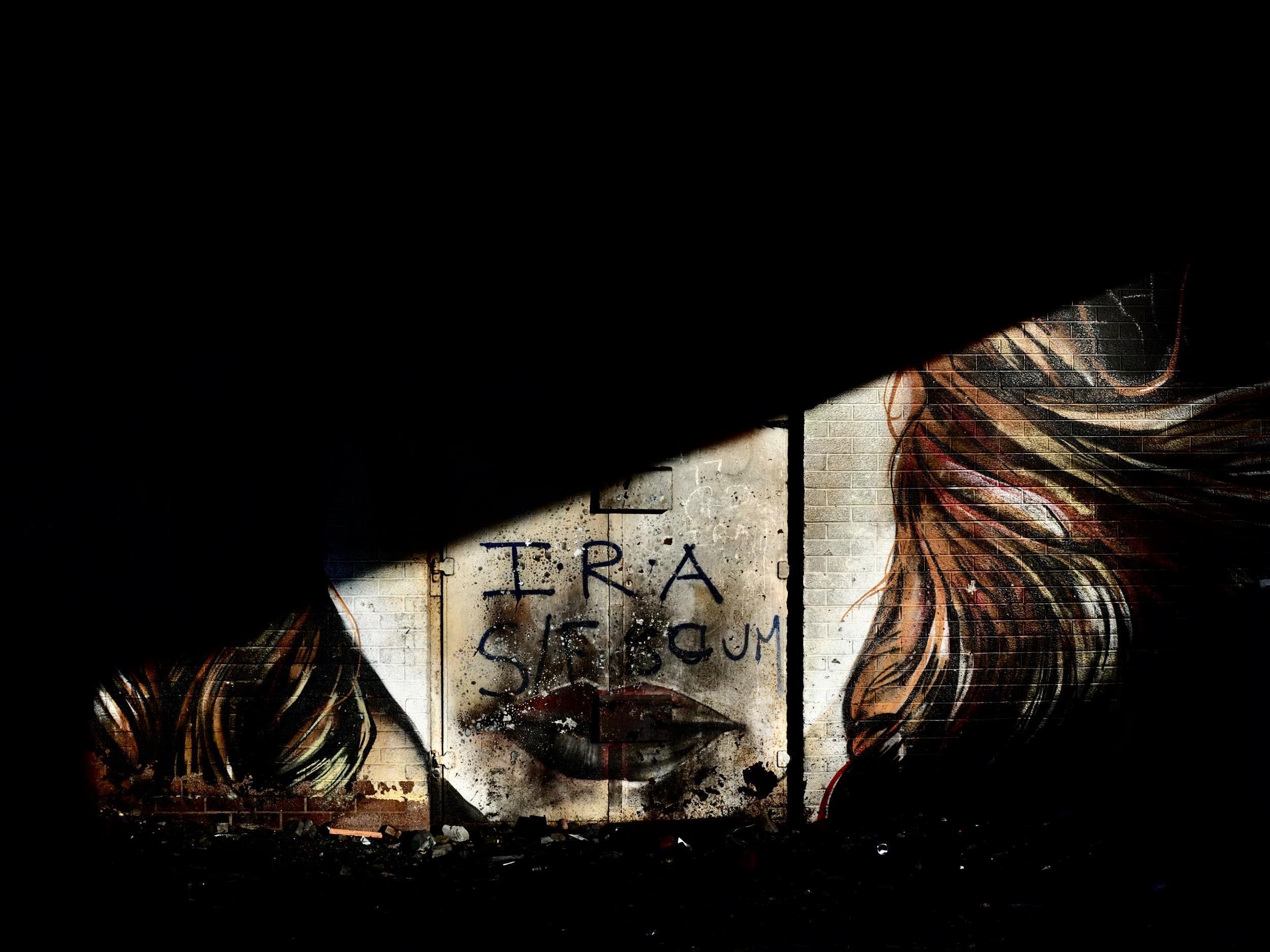
8/12 Derry, Londonderry
Under a motorway bridge a woman’s face stares, auburn and red-lipped, her skin tattooed with support for the IRA and a message of hostility to advocates of the Social Investment Fund
Richard Morgan/The Independent
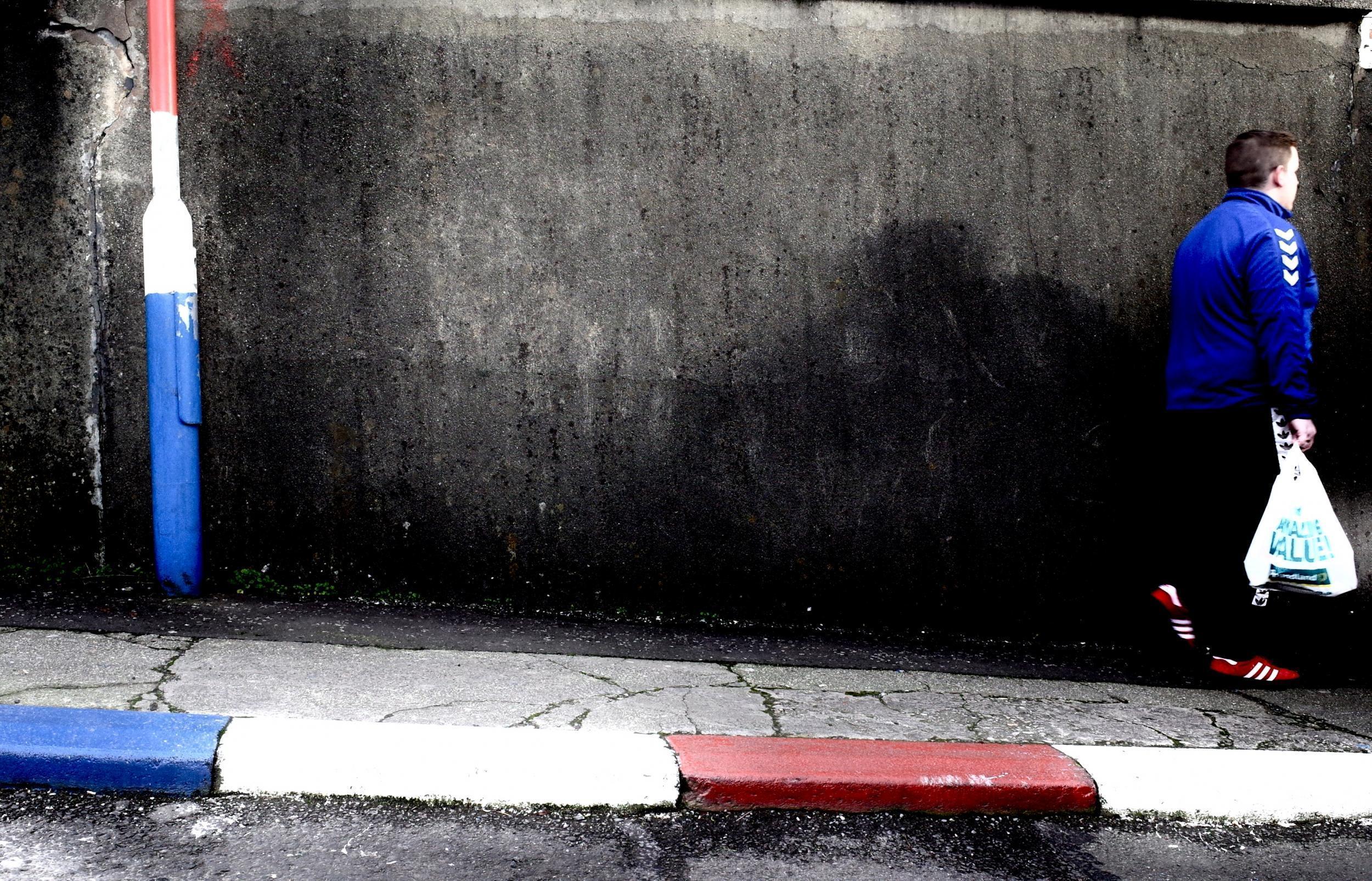
9/12 Derry, Londonderry
The Fountain Murals, where the curbs and the lampposts are painted the red, white, and blue of the Union Flag. A boy walks past in the same colours, fitting the scene, camouflaged
Richard Morgan/The Independent
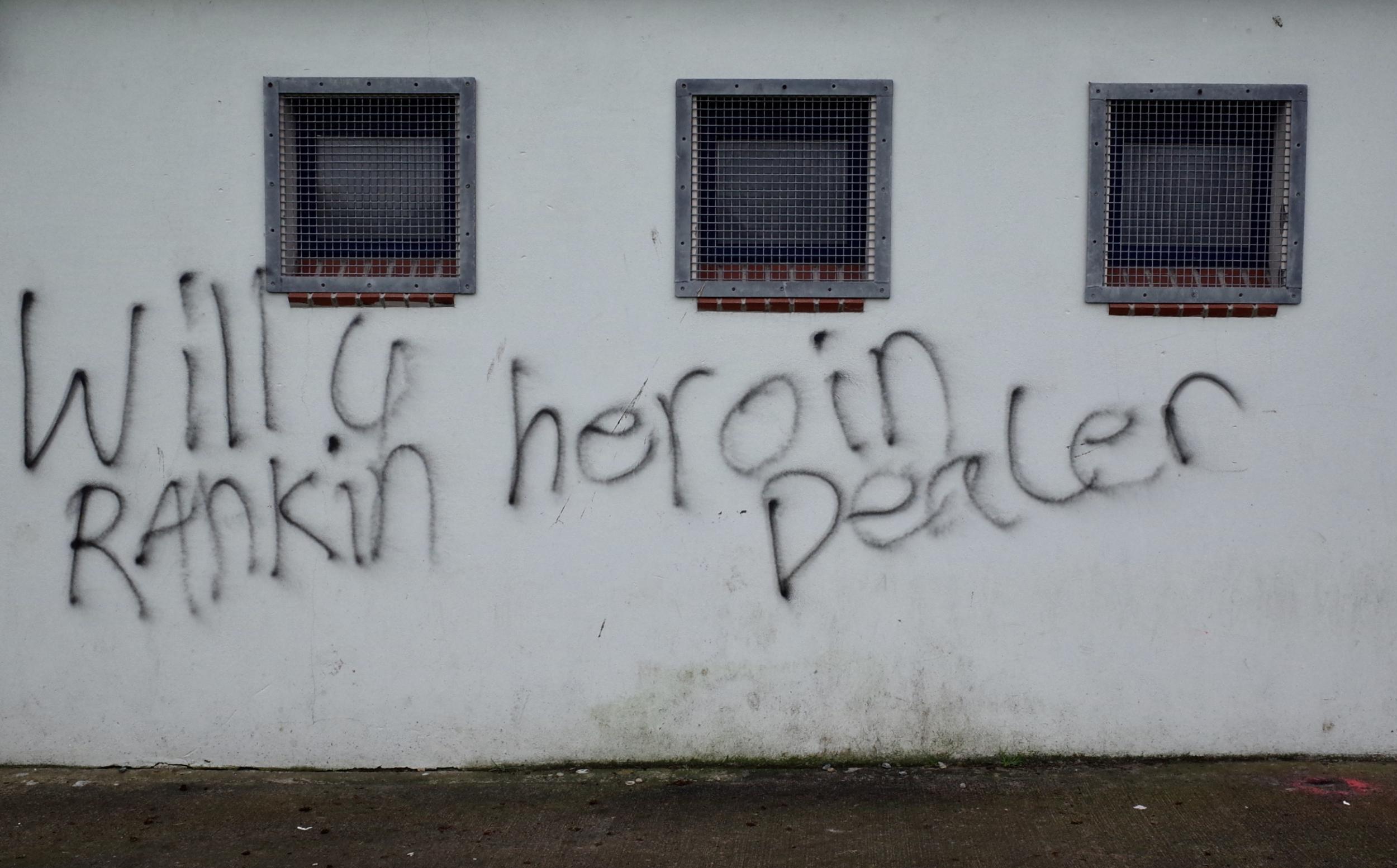
10/12 Coleraine
A public slandering by the football fields, for all to see or ignore. I wonder if it’s for the police or for the community
Richard Morgan/The Independent

11/12 Belfast
A tattoo parlour, where the artist has downed tools, momentarily, bringing poise to the scene, which looks like a place of mourning, not a site of creation
Richard Morgan/The Independent
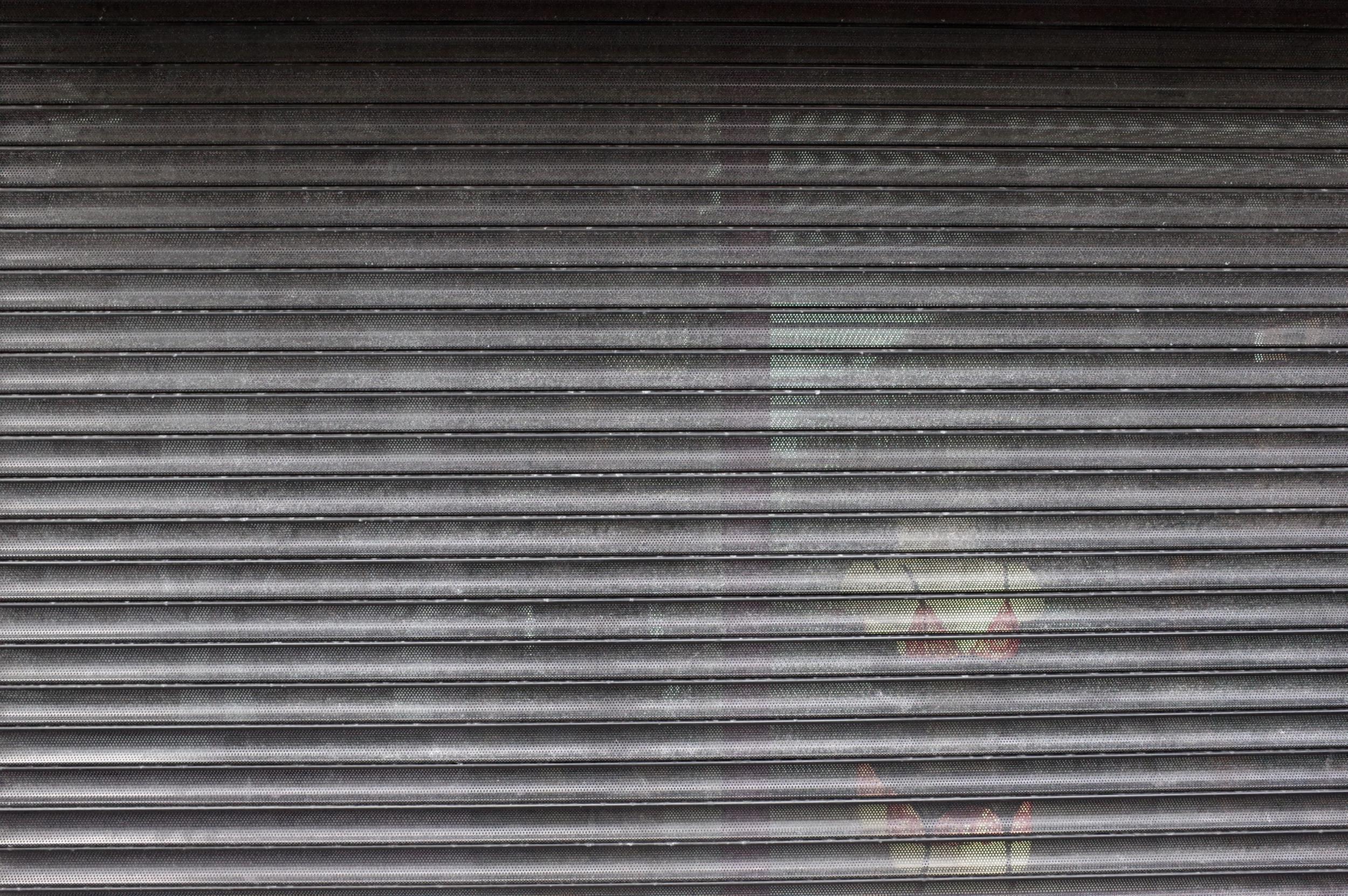
12/12 Derry, Londonderry
A barrier of grey protects the contents of this shop, guarding it from the streets outside, but it cannot conceal it completely, and the colours of lust and desire and temptation cut through
Richard Morgan/The Independent

1/12 Derry, Londonderry
A garage door displaying unionism, bolted shut, like a visual representation of Brexit Britain, locked to outsiders, safeguarding what’s inside
Richard Morgan/The Independent

2/12 Derry, Londonderry
Rossville Street, the site of Bloody Sunday, where messages demand a severance with England. From this perspective, Britain is England in sheep’s clothing, the real empire, the centre of colonial power
Richard Morgan/The Independent

3/12 Bangor
A political message in paint not yet dry, still forming, setting, adjusting, or in old paint finally eroding, melting away
Richard Morgan/The Independent

4/12 Bangor
Moral judgement frames a residential view. The message seeks to make everybody involved in the religious narrative: those who don’t believe are those most in debt
Richard Morgan/The Independent

5/12 Castlerock
The beach is sparse and almost empty, but covered in footprints. The shower is designed to wash off sand, and a mysterious border cuts a divide through the same sand
Richard Morgan/The Independent

6/12 Belfast
Two attempts to affect and care for the body. One stimulated by vanity and social norms and narratives of beauty, the other by a need to keep warm in the winter night
Richard Morgan/The Independent

7/12 Belfast
The gate to an unclaimed piece of land, where nothing is being built, where no project is in the making, where a sign demands the creation of something new
Richard Morgan/The Independent

8/12 Derry, Londonderry
Under a motorway bridge a woman’s face stares, auburn and red-lipped, her skin tattooed with support for the IRA and a message of hostility to advocates of the Social Investment Fund
Richard Morgan/The Independent

9/12 Derry, Londonderry
The Fountain Murals, where the curbs and the lampposts are painted the red, white, and blue of the Union Flag. A boy walks past in the same colours, fitting the scene, camouflaged
Richard Morgan/The Independent

10/12 Coleraine
A public slandering by the football fields, for all to see or ignore. I wonder if it’s for the police or for the community
Richard Morgan/The Independent

11/12 Belfast
A tattoo parlour, where the artist has downed tools, momentarily, bringing poise to the scene, which looks like a place of mourning, not a site of creation
Richard Morgan/The Independent

12/12 Derry, Londonderry
A barrier of grey protects the contents of this shop, guarding it from the streets outside, but it cannot conceal it completely, and the colours of lust and desire and temptation cut through
Richard Morgan/The Independent
“To choose a No Deal Brexit crash out when an option to extend the transition is possible would be an act of national self-harm when our NHS, economy and food supply chains are already stretched and struggling. It is time the Prime Minister did the right thing.”
A European Commission spokesperson said: “The Commission has repeatedly underlined the importance of the UK setting out its plans with regard to all implementation measures prescribed by the Protocol on Ireland / Northern Ireland and providing a detailed timetable. The required implementation measures are set out in the Commission’s technical note of 30 April.
“In that respect, the Commission welcomes the publication of the UK’s paper on the implementation of the Protocol on Ireland / Northern Ireland, which it will now study in detail. We will share our assessment with the European Parliament and Member States and look forward to detailed discussions with the UK at technical level.
“The Protocol provides a stable and lasting solution to address the unique circumstances on the island of Ireland. This solution avoids a hard border and protects the Good Friday (Belfast) Agreement in all its dimensions, while also safeguarding the integrity of the EU’s Single Market.
“The detailed legal commitments set out in the Protocol must now be implemented precisely to give full effect to this solution. The time to implement the Protocol is short, and practical implementation measures must start immediately so that the Protocol can be operational by 1 January 2021. To this end, the Commission stands ready to work with the UK authorities.”



